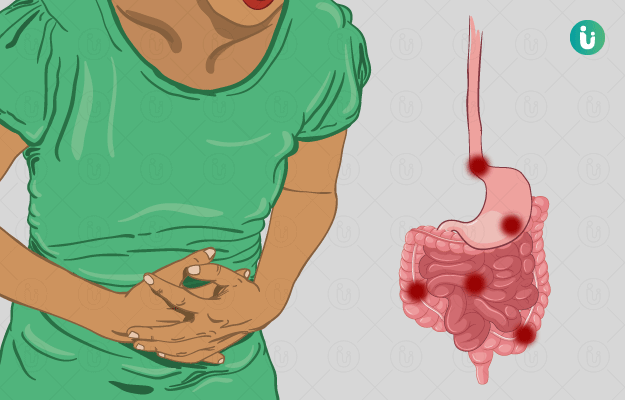What is stomach infection?
Infections in the stomach can be caused by bacteria or viruses and results in inflammation of the lining of the digestive tract, particularly the stomach and intestines (gastroenteritis).
What are its main signs and symptoms?
- The common signs and symptoms of stomach infection due to bacteria and viruses include:
- Fever
- Loss of weight
- Loss of appetite
- Vomiting
- Nausea
- Abdominal pain with cramping
- Bloody stools or diarrhoea
- In case of severe stomach infection, signs and symptoms include:
- Chills or sweating
- Clammy skin
- Joint stiffness or muscle pain
What are the main causes?
Stomach infection can be caused by consumption of contaminated food or water which contains viruses (rotavirus, Norwalk virus, etc.) or pathogenic bacteria. Other causative factors include :
- Contact with contaminated food and water
- Contact with contaminated objects which include plates and utensils
- Sharing utensils with an infected person
How is it diagnosed and treated?
- The diagnosis is mainly considered by the physician based on the symptoms of infection and the signs of dehydration, which include:
- Dry or sticky mouth
- Low blood pressure
- Less/no/concentrated urine (dark yellow urine)
- Sunken eyes and fontanelles (soft spot on the top of baby’s head)
- No tears
- Lethargy or coma (in case of severe dehydration)
- A complete blood count (CBC) test can be done, which measures the white blood cells (WBCs). An increase in WBCs indicates infection.
- A routine stool test or stool culture may also be advised (in case of bacterial infection).
Treatment of a stomach infection includes:
- Managing diarrhoea:
- In case of diarrhoea along with nausea and vomiting where liquid intake is not tolerated or is thrown up, it is necessary to give fluids through a vein (intravenous; IV).
- Patients on medications for high blood pressure like diuretics or angiotensin-converting enzyme (ACE inhibitors) may be advised by their doctor to temporarily stop these medications when they have a stomach infection and restart them when they feel better.
- Managing dehydration:
- Use of electrolyte and fluid replacement solutions or freezer pops is recommended to correct dehydration.
- Avoid colas, fruit juices and sodas.
- Avoid forcing down large amounts of liquids, instead, sip small amounts of fluids.
- In case of a stomach infection in babies, closely monitor baby’s diapers to check for dehydration (less urine or fewer wet diapers than usual).
- Managing nausea and vomiting: Avoid large meals and try eating small amounts of food at regular intervals, such as plain yoghurt, bananas, fresh apples, cooked vegetables, cereals, baked or mashed potatoes, lean meat and bread.
- Taking plenty of rest.
- Antibiotics are required only for individuals with bacterial infection when they have severe diarrhoea or a weak immune system. Antibiotics do not treat viral infections.
- Antipyretic drugs to control fever.
- Medications to stop/control diarrhoea can be considered on physician advice.

 Doctors for Stomach Infection
Doctors for Stomach Infection  OTC Medicines for Stomach Infection
OTC Medicines for Stomach Infection
 Lab tests for Stomach Infection
Lab tests for Stomach Infection Stomach Infection articles
Stomach Infection articles

 First Aid for Stomach Infection
First Aid for Stomach Infection
 Home Remedies for Stomach Infection
Home Remedies for Stomach Infection







 Editorial Team
Editorial Team












